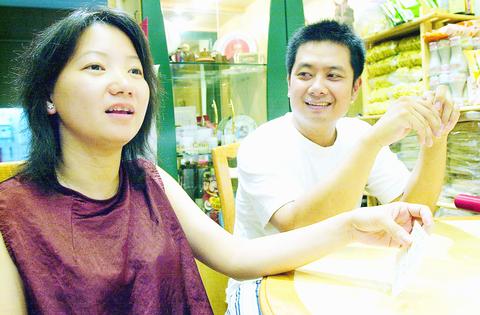Nguyen Thi Leu of Vietnam finally bid farewell to Taiwan on Saturday, which she had called home. During her four-month stay, she said her beautiful dream of a better life in a new country became a nightmare, as her new home turned into hell.
"I'd never want to come back again," she said.
Nguyen, 21, was handpicked by her Taiwanese husband, who is 13 years her senior, at a bride camp in Ho Chi Minh City in May. Three days later, he gave her family NT$5,000 (US$150) as a gift for the wedding.

PHOTO: CHEN CHENG-CHANG, TAIPEI TIMES
While Nguyen thought she was about to embark for a new and better life in a foreign land, she quickly learned that things were not what she had expected.
Just a few days after her wedding, Nguyen found out that her husband was already married with three children, and that his wife was living above their apartment in a building in Wuku, Taipei County. Nguyen said her husband told her that he was divorced from his first wife.
During the four-month marriage, Nguyen said she was physically and verbally abused by her husband, the other wife and the wife's family.

PHOTO: CHEN CHENG-CHANG, TAIPEI TIMES
Although Nguyen personally did not wish to file for a divorce, she said she was tricked into signing divorce papers because she could not read Chinese and spoke little of the language.
"I still love him. He is, after all, my husband," Nguyen said.
Sitting at a McDonald's on Chungshan North Road in Taipei City's Shihlin District, Nguyen said that her four-month marriage has changed her life for good.
"I regret that I married a Taiwanese and I don't think I'll ever get married again," said Nguyen, who was still wearing her gold wedding band.
The second child and the first daughter of a family of six, Nguyen was recruited by the bride camp in Ho Chi Minh City, which promised her family that it would find her a rich husband from either Taiwan or South Korea.
Nguyen's parents, who eke out a meager living by fishing, encouraged her to go to the bride camp because it seemed the only way to get Nguyen -- an elementary school drop-out -- out of poverty.
"I didn't want to go because if I did, I'd have to break up with my boyfriend," she said, wiping her tears.
"I eventually ended up going because I had to help my family pay off its debts."
Nguyen's family had borrowed US$1,000 from loan sharks when she was 15 so that she could have surgery on her intestines. The mounting interest on the loan over the last five years had only exacerbated the family's economic difficulties.
Nguyen said there were about 10 women at the bridal camp while she was there. Food and accommodation were provided free of charge, with the husbands reimbursing the camp for their brides' expenses.
Nguyen's husband paid NT$8,500 to marry Nguyen, including the NT$5,000 that went to her family.
After six months of waiting, Nguyen met her husband. However, the four-month marriage was one nightmare after another.
"His [other] wife did everything to pick fights with me. When she was really upset with me, she would use scissors to cut my clothes," Nguyen said.
In addition to her husband's three children, Nguyen said she also had to take care of her husband's sister-in-law's three children.
Nguyen said she was badly beaten by her husband when she confronted him about tricking her into signing the divorce papers.
"They held me by the hands so he would be easily able to hit me," she said, referring to her husband's wife and his mother-in-law.
After the beating, Nguyen saw a doctor, who gave her a document certifying that she had been injured in a manner which strongly suggested abuse.
Armed with the certificate, Nguyen was ready to file a lawsuit against her husband, but was dissuaded from doing so because he said he would pay her NT$120,000 to settle the matter out of court.
With the money now in her hands, Nguyen said she would use it to help her family pay off its debt.
"One thing I'm reluctant to let go of here is my father-in-law," she said. "A few days ago, he was telling me over the phone how much he missed me. I'd really hate to tell him that our marriage didn't work." (Nguyen's father-in-law did not live in the building with her husband's family.)
Love at first sight
It was love at first sight when Fang Tse (方策) was introduced to Nguyen Thi Diem (no relation to Nguyen Thi Leu), during his vacation in Vietnam in the summer of 1993.
After corresponding for a year, the two finally tied the knot.
Now happily married with a four-year-old boy, Fang, 35, said that he was attracted to Vietnamese women because they are beautiful and share similar culture and customs.
"Although my wife didn't speak Chinese when we met, she took the time to learn and asked her Chinese friends to read my letters to her in Vietnamese and to write me back in Chinese," Fang said at the kitchen table of his Tamsui home on Tuesday evening.
Although his parents at first disapproved of his decision to marry a foreigner, Fang said that they eventually gave in.
When Nguyen first came to Taiwan, the food was one of the many things that she had trouble adjusting to.
"It took her six months to get used to the food and about a year to adapt to the environment," Fang said.
Now looking more Taiwanese than her husband, who is a native of the Paiwan tribe, Yguyen is a volunteer interpreter and counselor at the foreign brides training camps sponsored by Taipei City's civil affairs bureau.
"I know how hard it is to marry a foreign husband and live in a foreign country. My heart sinks when I think of those who are not as lucky as I am to have such a loving husband and such caring in-laws," she said.
Nguyen did not encounter much opposition from her family and friends when she decided to marry Fang.
"My parents adore him because they think he's an honest man although he's not rich," Nguyen said.
"Besides, it doesn't bother me much to live in a foreign country as long as I'm with the one I love."
One piece of advice Nguyen said she would give to foreign brides is to reach out for help.
"Over the past few months as a counselor, I've seen many foreign brides withdraw from society because of their limited communication skills. My advice to them is to speak out because no one will know your problems and come to your rescue if you keep it to yourself," she said.

CHIP WAR: The new restrictions are expected to cut off China’s access to Taiwan’s technologies, materials and equipment essential to building AI semiconductors Taiwan has blacklisted Huawei Technologies Co (華為) and Semiconductor Manufacturing International Corp (SMIC, 中芯), dealing another major blow to the two companies spearheading China’s efforts to develop cutting-edge artificial intelligence (AI) chip technologies. The Ministry of Economic Affairs’ International Trade Administration has included Huawei, SMIC and several of their subsidiaries in an update of its so-called strategic high-tech commodities entity list, the latest version on its Web site showed on Saturday. It did not publicly announce the change. Other entities on the list include organizations such as the Taliban and al-Qaeda, as well as companies in China, Iran and elsewhere. Local companies need

CRITICISM: It is generally accepted that the Straits Forum is a CCP ‘united front’ platform, and anyone attending should maintain Taiwan’s dignity, the council said The Mainland Affairs Council (MAC) yesterday said it deeply regrets that former president Ma Ying-jeou (馬英九) echoed the Chinese Communist Party’s (CCP) “one China” principle and “united front” tactics by telling the Straits Forum that Taiwanese yearn for both sides of the Taiwan Strait to move toward “peace” and “integration.” The 17th annual Straits Forum yesterday opened in Xiamen, China, and while the Chinese Nationalist Party’s (KMT) local government heads were absent for the first time in 17 years, Ma attended the forum as “former KMT chairperson” and met with Chinese People’s Political Consultative Conference Chairman Wang Huning (王滬寧). Wang

CROSS-STRAIT: The MAC said it barred the Chinese officials from attending an event, because they failed to provide guarantees that Taiwan would be treated with respect The Mainland Affairs Council (MAC) on Friday night defended its decision to bar Chinese officials and tourism representatives from attending a tourism event in Taipei next month, citing the unsafe conditions for Taiwanese in China. The Taipei International Summer Travel Expo, organized by the Taiwan Tourism Exchange Association, is to run from July 18 to 21. China’s Taiwan Affairs Office spokeswoman Zhu Fenglian (朱鳳蓮) on Friday said that representatives from China’s travel industry were excluded from the expo. The Democratic Progressive Party government is obstructing cross-strait tourism exchange in a vain attempt to ignore the mainstream support for peaceful development

DEFENSE: The US would assist Taiwan in developing a new command and control system, and it would be based on the US-made Link-22, a senior official said The Ministry of National Defense is to propose a special budget to replace the military’s currently fielded command and control system, bolster defensive resilience and acquire more attack drones, a senior defense official said yesterday. The budget would be presented to the legislature in August, the source said on condition of anonymity. Taiwan’s decade-old Syun An (迅安, “Swift Security”) command and control system is a derivative of Lockheed Martin’s Link-16 developed under Washington’s auspices, they said. The Syun An system is difficult to operate, increasingly obsolete and has unresolved problems related to integrating disparate tactical data across the three branches of the military,